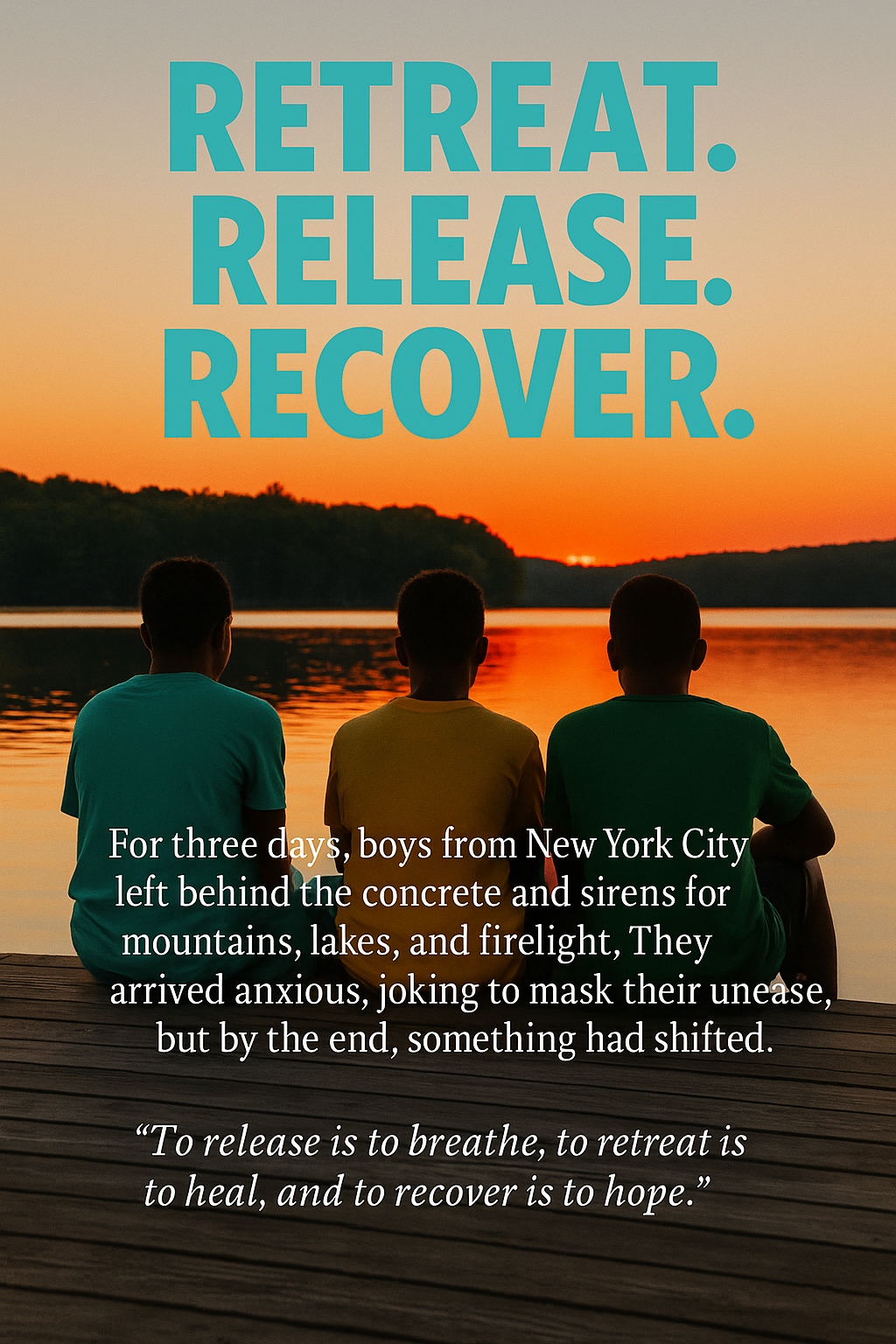Retreat. Release. Recover.
There is a mixture of energy in the air as the boys step onto the bus. For many, this is their first trip beyond the rhythms of New York City: the constant sirens, the elevated trains, the crowded sidewalks. Leaving behind the familiar chaos of the city is not just a physical journey but a symbolic one. Within two hours, the terrain outside their window begins to change. Bridges give way to mountains. Asphalt turns into winding roads cut into the earth. The island of Manhattan fades into memory. This is the beginning of retreat.
Release
The first exhale comes as the bus climbs a steep mountain road. Anxiety and jokes ripple through the bus half bravado, half nerves. For boys raised in a city where the skyline walls them in, the vastness of nature feels almost impossible, an unconquerable force. The jokes are a way of managing fear. Yet, the view itself is the first real release.
When they arrive at their destination, a sprawling, 15-bed home perched on the edge of a lake many of the boys are stunned into silence. One gazes at the sunset over the water, later asking for that moment to be captured in a single photo. The city has been left behind, if only temporarily. But what weighs heavier than New York itself are the versions of self that these boys carry from their neighborhoods: the armor of toughness, the constant vigilance, the demand to perform survival. The retreat invites them to let some of that go.
Retreat
Each morning begins with meditation and reflection. Stillness, for them, is not just a novelty but a challenge. What does it mean to sit quietly in the face of water, sun, and silence? What does it mean to let the mind wander without the pull of sirens or the need to look over one’s shoulder? For some, the quiet is unsettling. For others, it becomes a moment of rediscovery of the childlike wonder that was never fully allowed to grow.
Nature amplifies this transformation. Canoeing and hiking replace concrete and corner stores. A scavenger hunt in the woods sparks laughter, reminding them that joy, too, can be an act of survival. In the dark of night, the boys gather around a fire. For many, the silence of the woods is its own kind of fear different from police harassment or neighborhood violence, but fear nonetheless. The threat of bears and bobcats becomes the new bogeyman. Yet, as the fire crackles, they surrender to the unknown. Fear gives way to awe.
The word “retreat” has many definitions: to fall back, to surrender, to withdraw. Here, it takes on another meaning. Permission to drop walls, to let down guards, to be vulnerable in ways their everyday lives rarely allow.
Recover
By day three, the retreat shifts from play to lesson. The boys face off in a game of tug-of-war, reimagined as “The Tug of Life.” Six boys against four, the imbalance purposeful. Life, after all, is rarely fair. The rope pulls both ways, sometimes too heavy, sometimes too sharp. Each boy must learn the power of support, the recognition that life’s weight is not meant to be carried alone. The metaphor deepens: the tug is not just physical but also mental and emotional, pulling against systemic racism, generational trauma, poverty, abandonment, and violence.
Later, a walk through the woods becomes a “Walk of Truth.” Along the trail, the boys are asked to confront questions: Who am I? Who do I want to be? What must I leave behind to move forward? At the end, they gather around a tree. Posted on its trunk is a single question: Where am I? The circle formed there becomes a space of reckoning. Boys who entered the retreat as individuals now yell their truths into the sky together, voices lifted toward something greater God, sun, stars, each other.
That final night, the fire returns. This time it is a ritual. Each boy writes down what he needs to release old identities, old pain, old fears and places it into the flames. Fire consumes, but it also purifies. Around the same fire where they once feared the night, they now laugh, make s’mores, and let go.
From Today Forward
Transformation is not measured in days, but in shifts of perspective. No retreat can undo years of survival in a city that demands toughness from its young men. But what these days in the mountains offered was glimpses, a reminder that another version of life is possible. That peace is not a luxury. That vulnerability is not weakness. That joy is not fleeting.
As an observer, I left with questions as well: What does it mean to release? What does it mean to retreat, not into defeat, but into healing? And what does it mean to recover not just from struggle, but toward the possibility of wellness?
In the end, the boys may not remember every exercise or every conversation. But I hope they remember the fire. I hope they remember what it felt like to release what no longer served them, to retreat into the stillness of their own minds, and to recover a sense of self that says: I deserve to be well.





